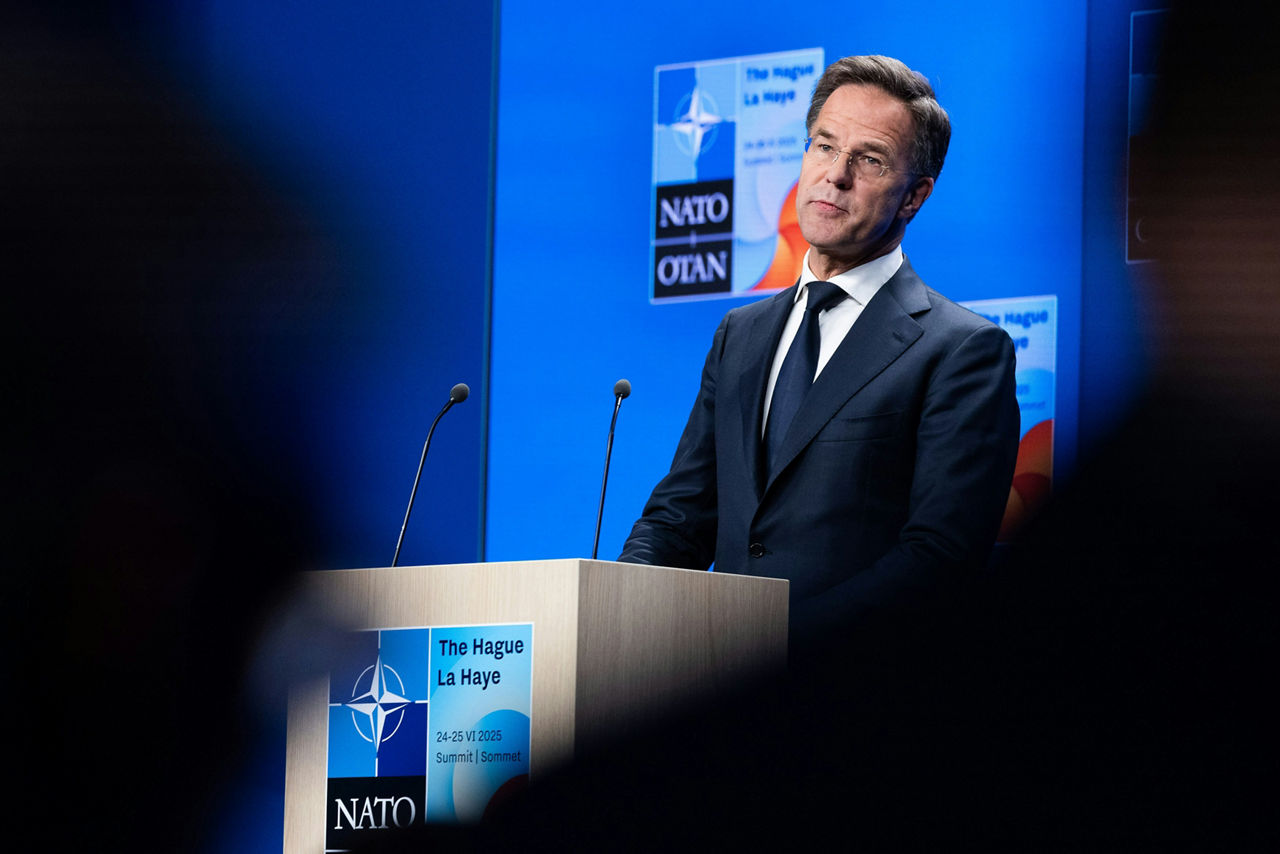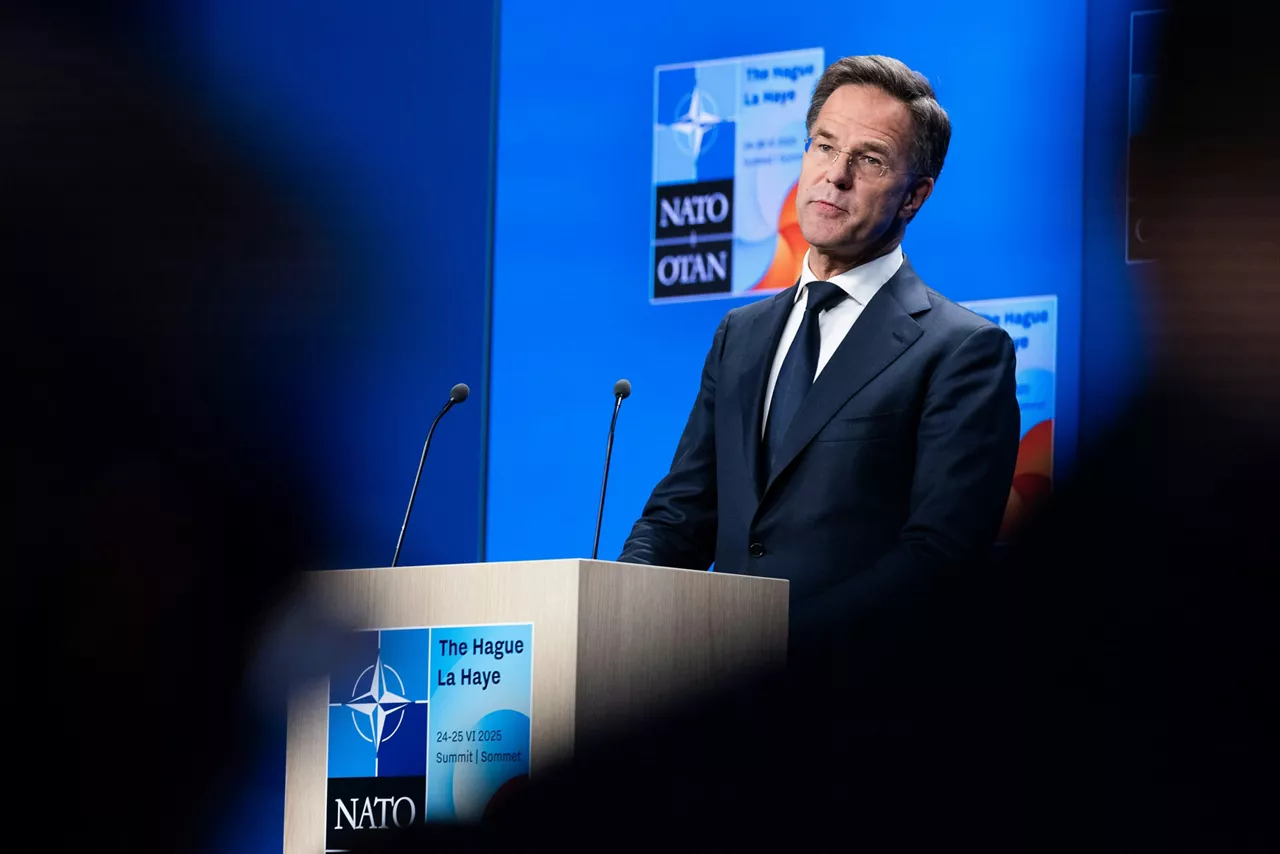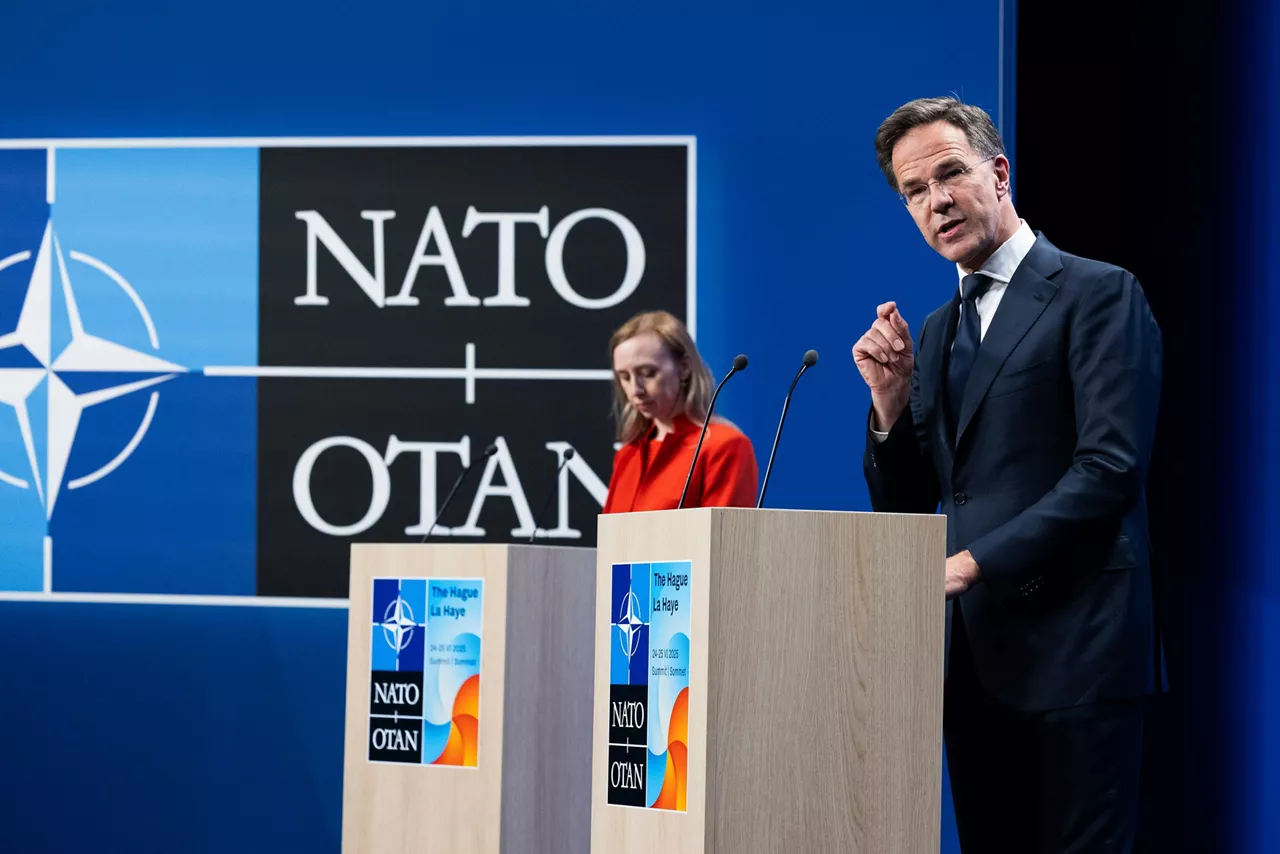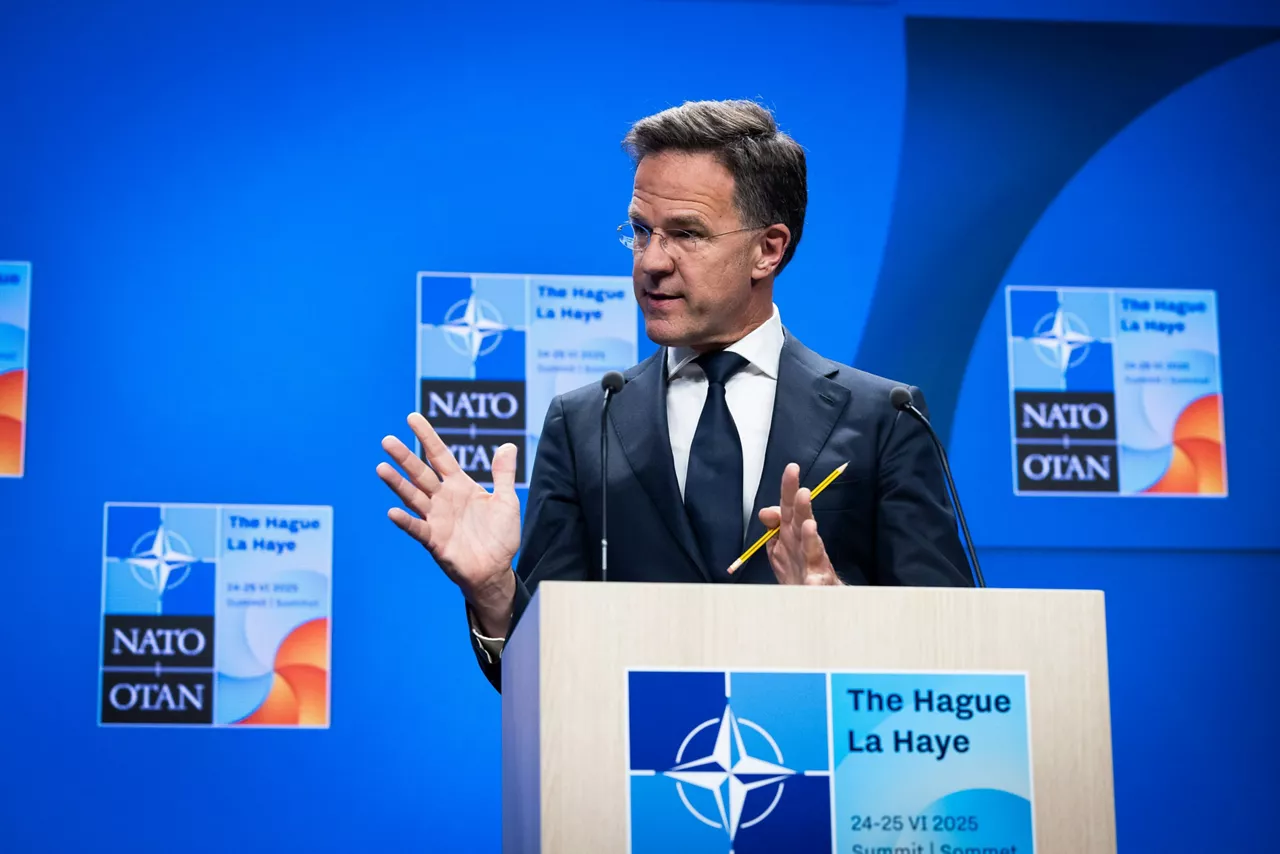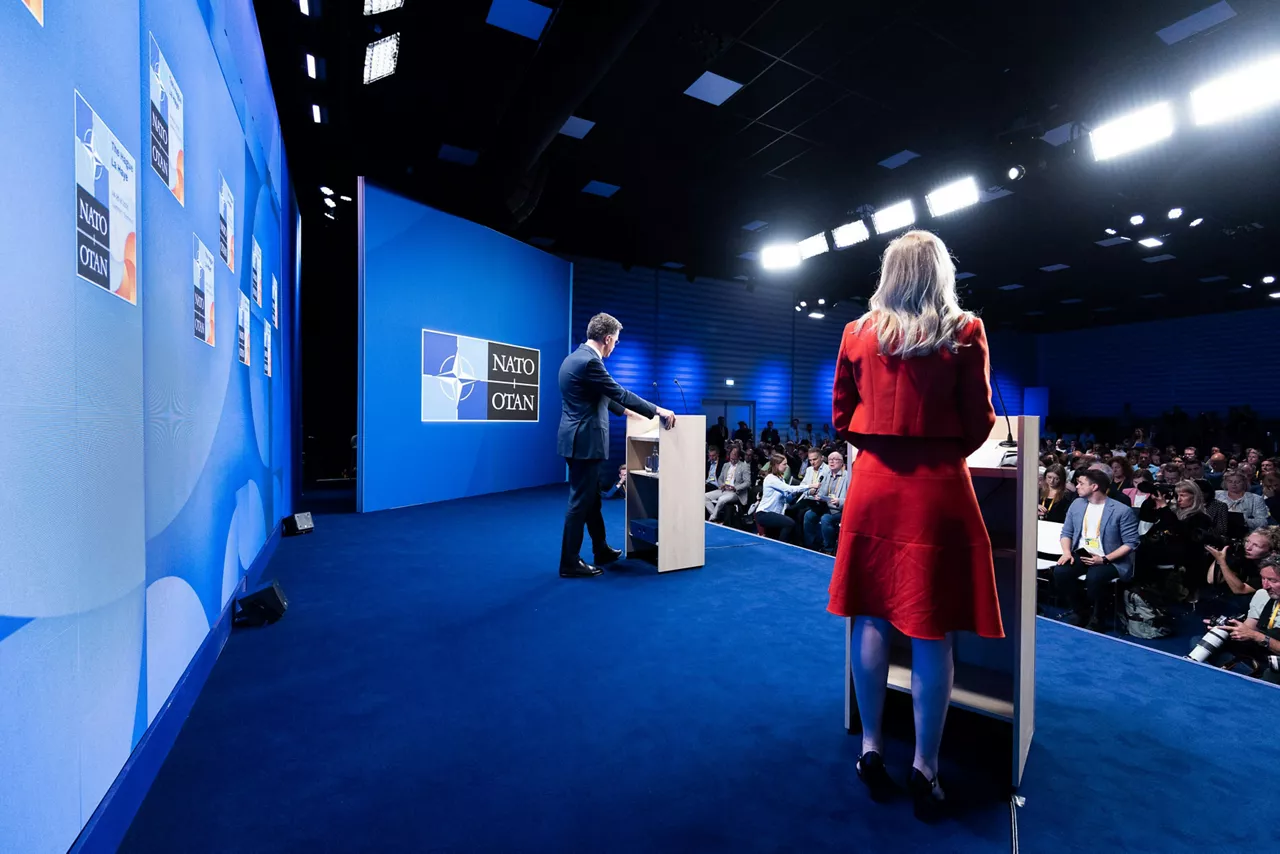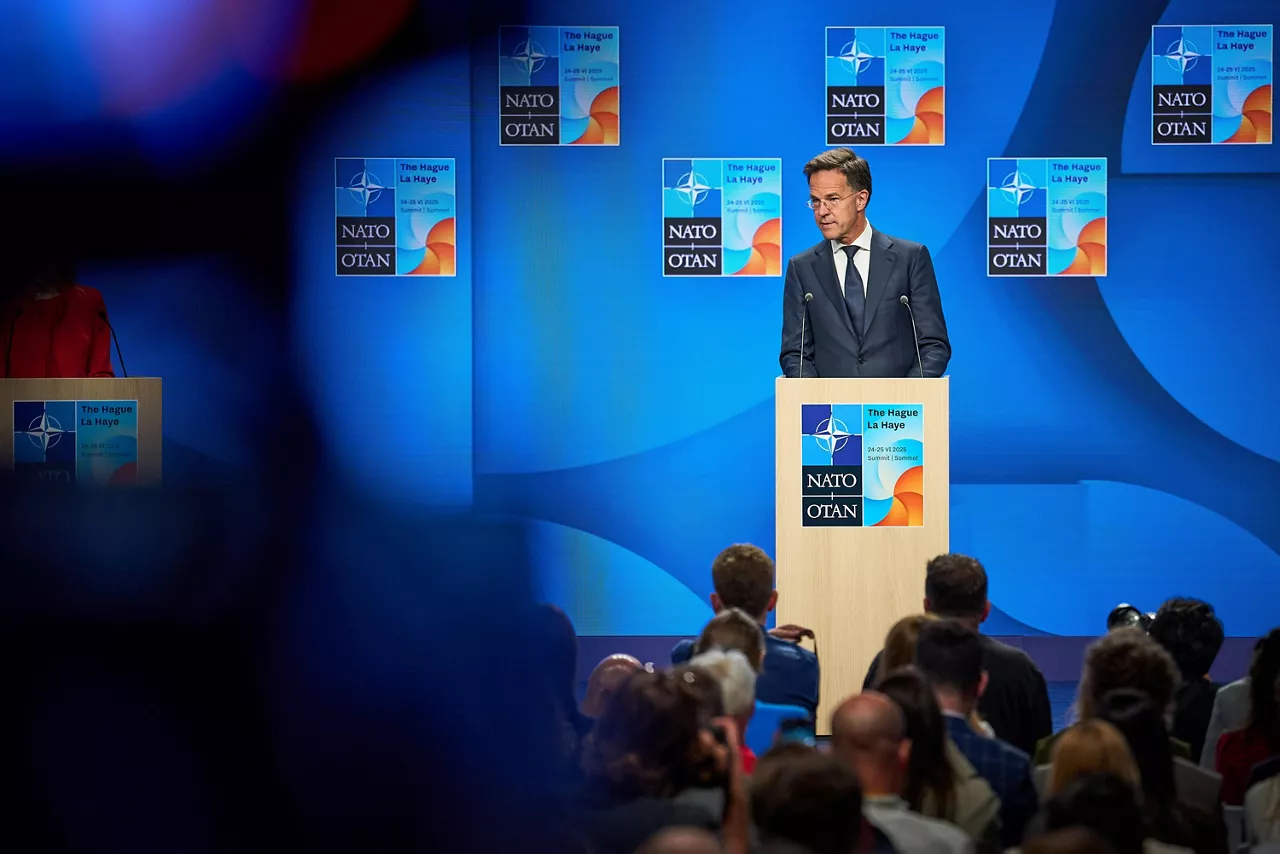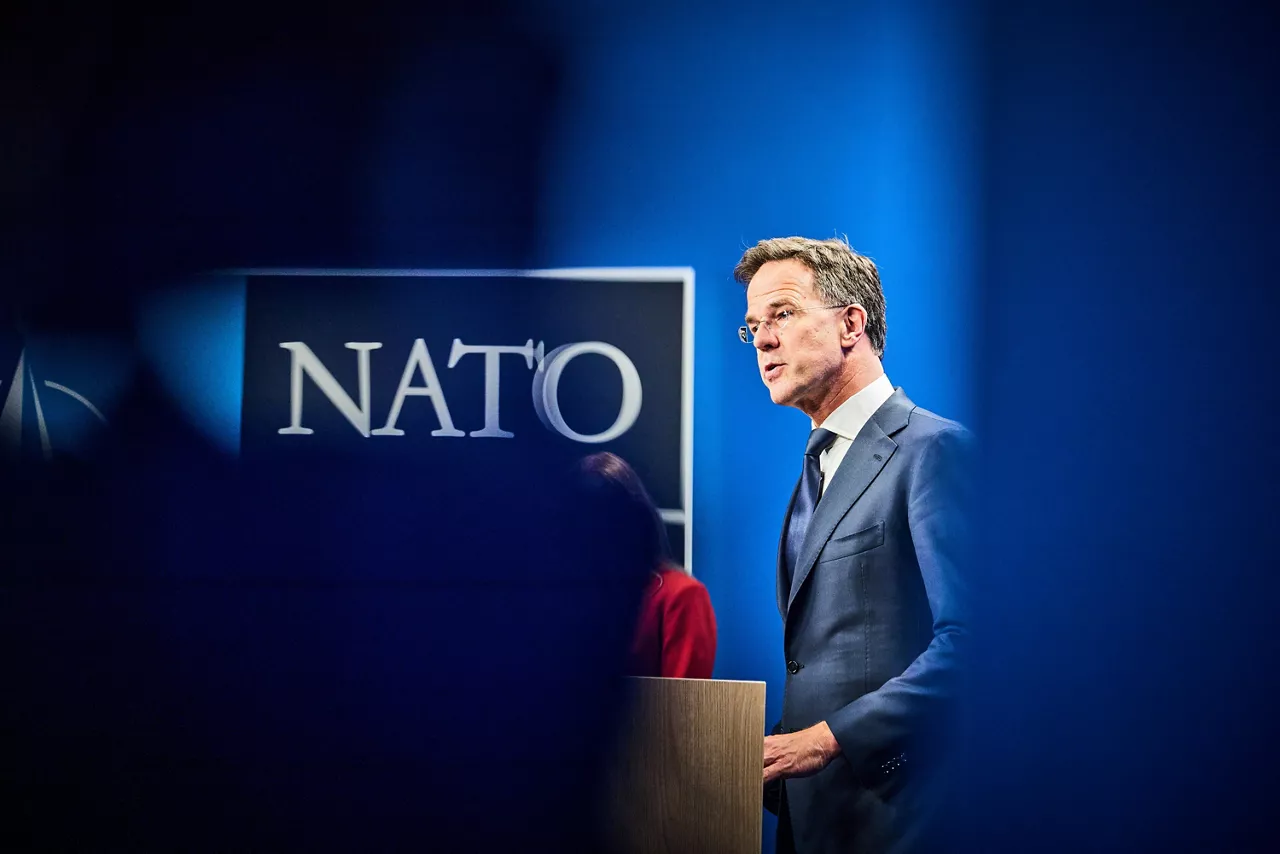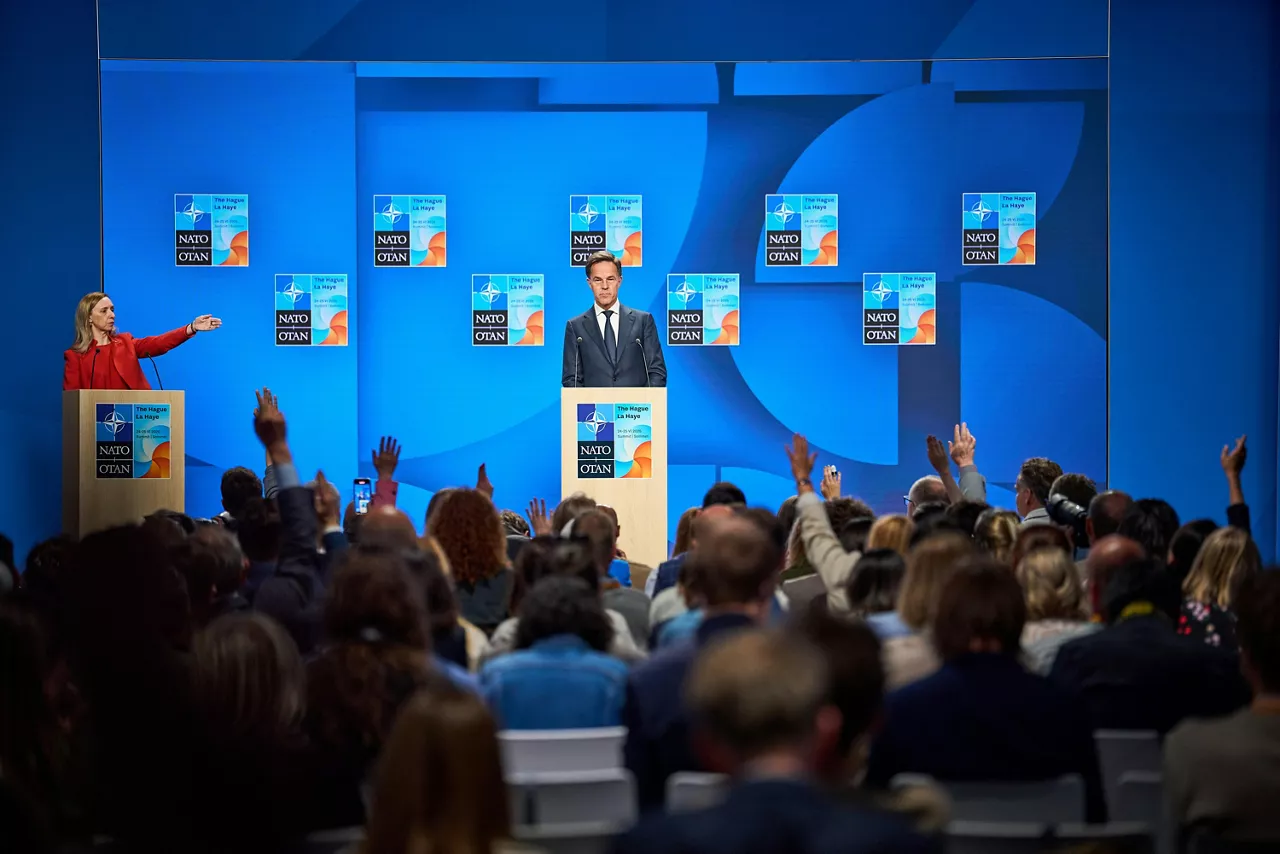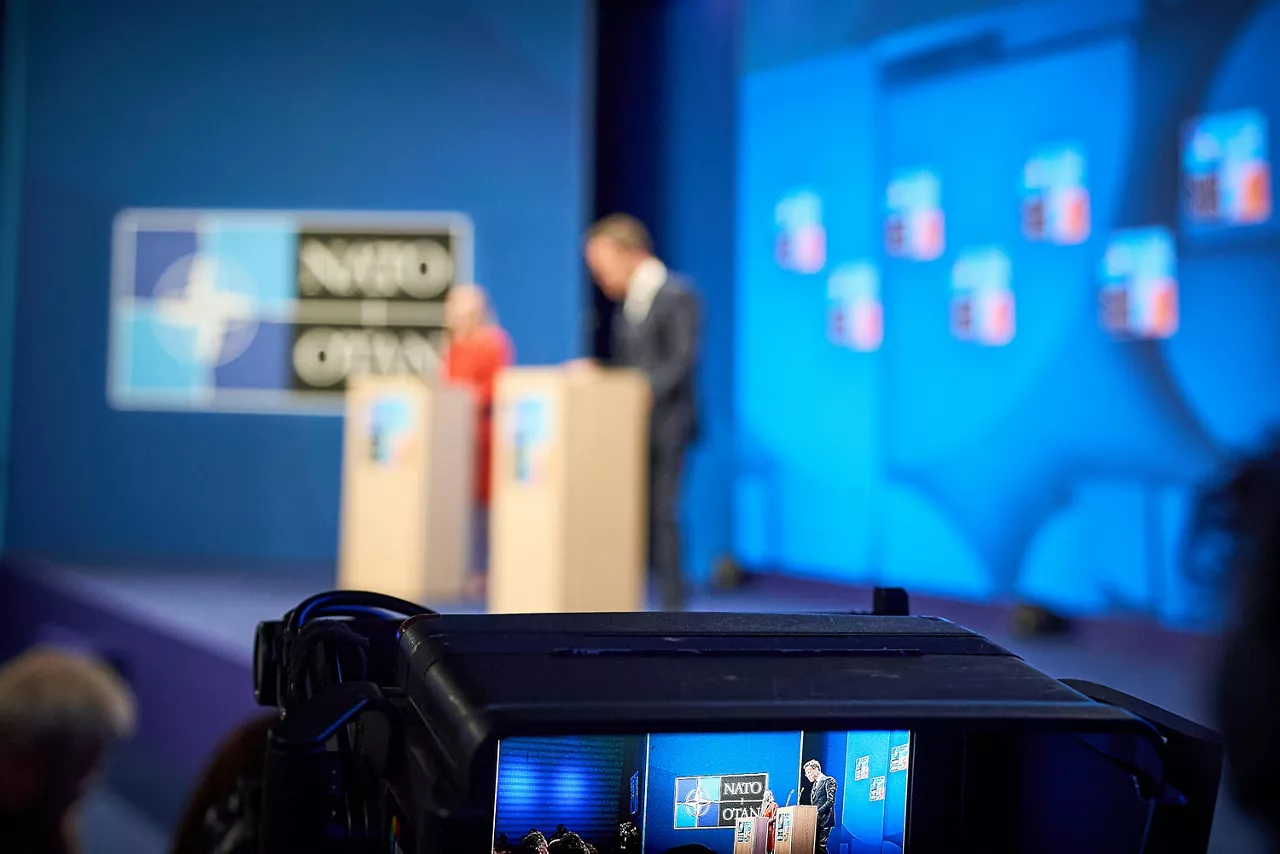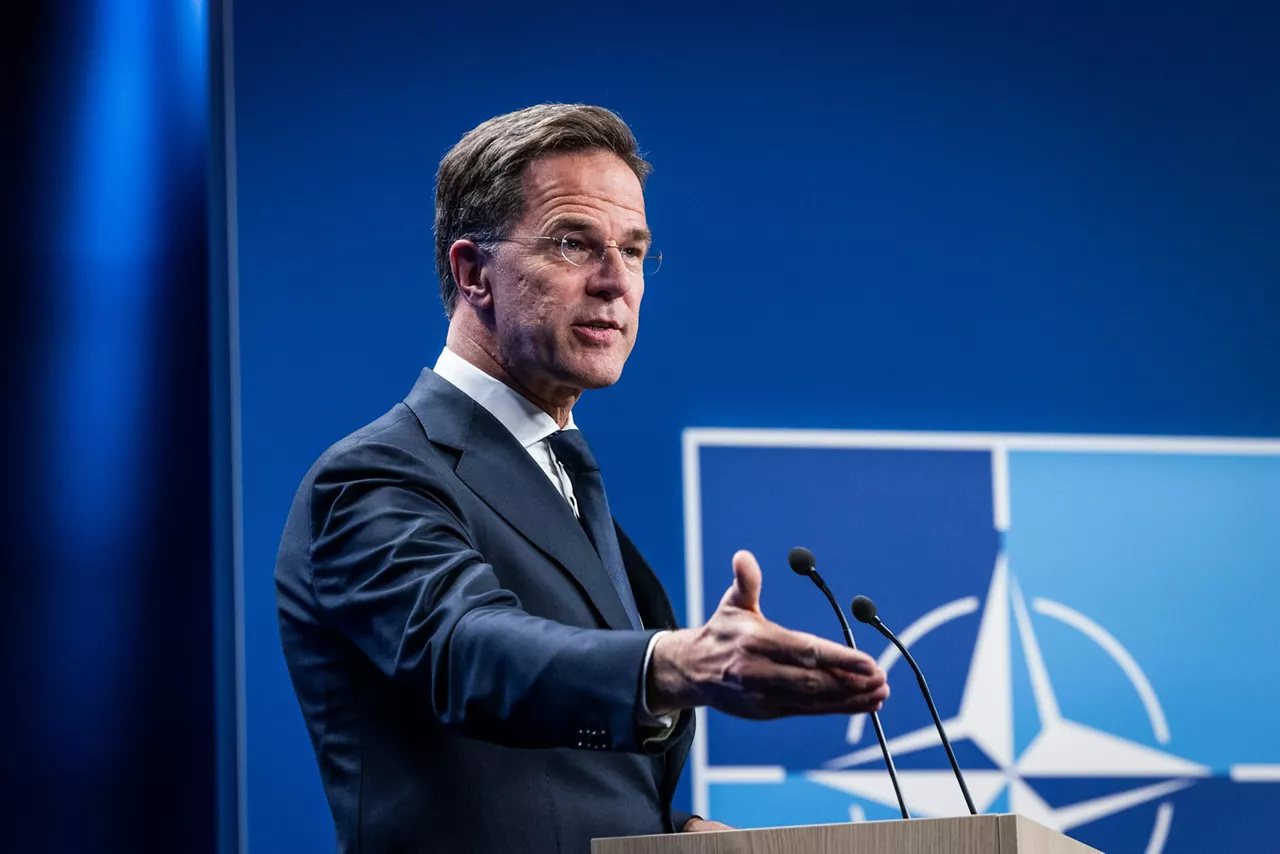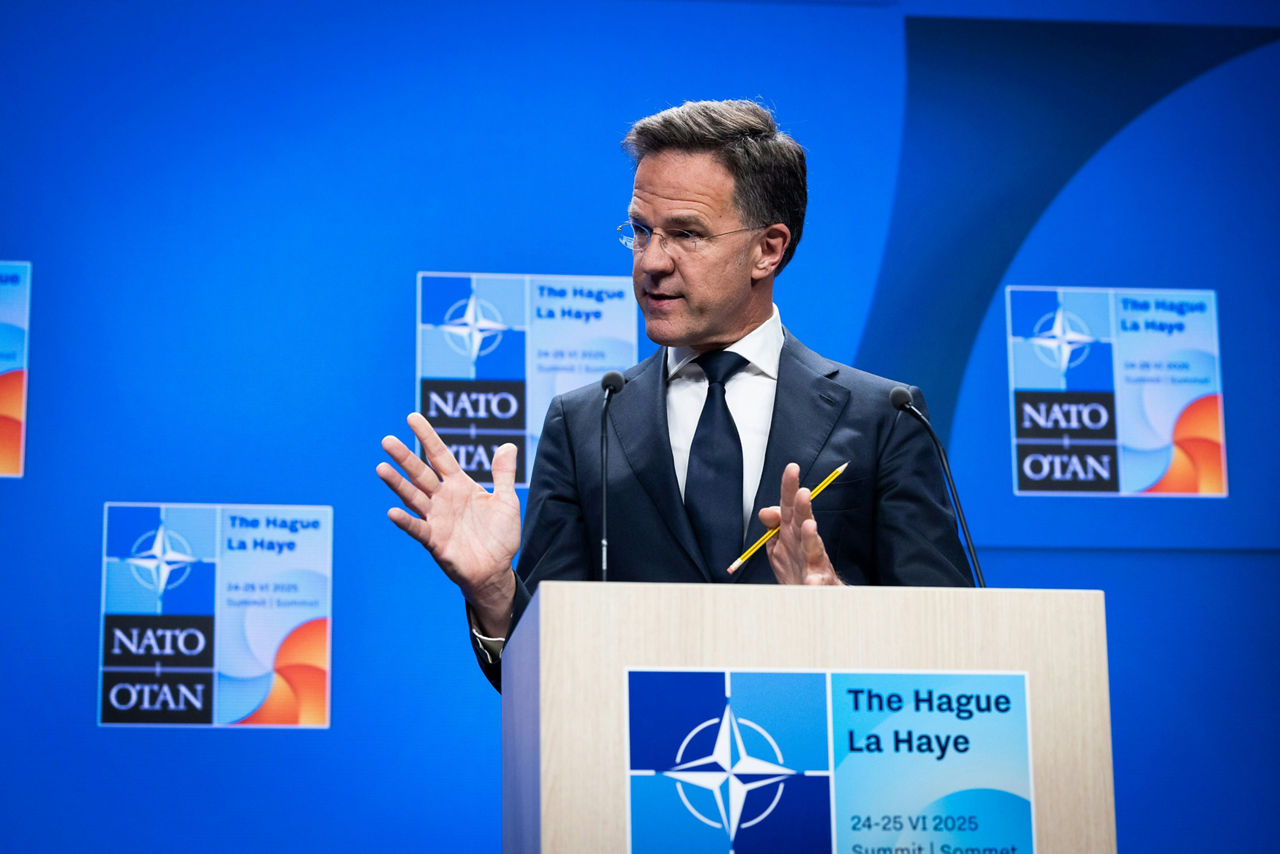Download NATO’s broadcast-quality video content free of charge

Log in
NATO MULTIMEDIA ACCOUNT
Access NATO’s broadcast-quality video content free of charge

Check your inbox and enter verification code
You have successfully created your account
From now on you can download videos from our website
Subscribe to our newsletter
If you would also like to subscribe to the newsletter and receive our latest updates, click on the button below.
Enter the email address you registered with and we will send you a code to reset your password.
Didn't receive a code? Send new Code
The password must be at least 12 characters long, no spaces, include upper/lowercase letters, numbers and symbols.
Your password has been updated
Click the button to return to the page you were on and log in with your new password.
(As delivered)
Acting NATO Spokesperson, Allison Hart - Good afternoon, and welcome to this pre-Summit press conference. We'll start with a statement from the Secretary General, and then we will turn to your questions.
NATO Secretary General, Mark Rutte - Good afternoon and welcome to my hometown, The Hague, for the 2025 NATO Summit.
And this is my first NATO Summit as Secretary General and the first NATO Summit to be hosted by the Netherlands. As a Dutchman, and as a native of this beautiful city, it is particularly meaningful to me that we gather here this week.
We meet at a truly historic moment, with significant and growing challenges to our security. As the world becomes more dangerous, Allied leaders will take bold decisions to strengthen our collective defence, making NATO a stronger, a fairer and a more lethal Alliance.
This will include a major new defence investment plan, raising the benchmark for defence investment to 5% of GDP. A concerted effort to ramp up defence industry across the Alliance, bringing not only greater security but also more jobs. And a continued focus on support for Ukraine, alongside the pursuit of a just and lasting end to Russia’s war of aggression.
All of this is essential to keeping our 1 billion citizens safe.
Let me now first say a word on Iran. When it comes to NATO’s stance on Iran’s nuclear programme, Allies have long agreed that Iran must not develop a nuclear weapon. Allies have repeatedly urged Iran to meet its obligations under the non-proliferation treaty.
On defence investment. In 2014, Allies agreed to a benchmark of investing 2% of GDP in defence. It is very good news that all Allies will now meet that target this year. We started 2025 with several Allies – seven, eight Allies - not meeting the mark. So we have made crucial progress in the last five, six months.
But our security environment has changed. And not for the better. The threats we face today demand that we do far, far more to ensure we can effectively deter and defend.
NATO has detailed defence plans in place. We know how to tackle the dangers that confront us. And we are committed to defending every inch of Allied territory, should any potential adversary make the mistake of attacking any Ally.
Based on those plans, Allies have agreed an ambitious new set of capability targets – the specific, practical requirements that ensures that we can implement our defence plans.
Having done this high-stakes homework, it is now clear what kind of investment it will take to effectively deliver what we need. And it is critical that each Ally carries their fair share of the burden.
The defence investment plan that Allies will agree in The Hague introduces a new baseline: 5% of GDP to be invested in defence. This is a quantum leap that is ambitious, historic, and fundamental to securing our future.
The new defence investment plan is the key deliverable for this Summit, and will be decisive when it comes to ensuring effective deterrence and defence.
The details of our plans are of course classified, but let me give you a few examples of what we will invest in.
A five-fold increase in air defence capabilities. Because we see Russia’s deadly terror from the skies over Ukraine every day, and we must be able to defend ourselves from such attacks. Thousands more tanks and armoured vehicles. Because even though warfare is changing fast, we still need to be able to protect our soldiers on the battlefield, and to manoeuvre. And millions of rounds of artillery ammunition, because it is by having these stockpiles that we can deter aggression from any threat.
As we invest more, it is crucial that we also produce more. At present, there is not nearly enough supply to meet our increased demand on either side of the Atlantic.
For this we need to work closely with industry – the major players that are the foundation of our defence industrial base as well as the newer players that will help as we innovate and ensure our technological edge going forward. It also means working together with our close partners, including Ukraine, the European Union and our partners from the Indo-Pacific.
We are already working on this and tomorrow at the NATO Summit Defence Industry Forum, we will continue to see new orders and concrete cooperation to expand our defence industrial base. We are sending a clear demand signal. We need industry to respond and we need industry to respond quickly.
Because there is an urgent need. There is also a tremendous upside to ramping up our defence production. Not only will we be more secure, but there is huge economic potential for our societies - including more jobs for our people.
By investing more and producing more, we build a stronger NATO. The result is also a fairer NATO, as Allies step up to ensure there is more equal sharing of responsibility for our shared security.
As we become stronger and fairer, we will also demonstrate that while NATO is and will remain a defensive Alliance – there should be no doubt about our ability and resolve to protect our nations and respond with resounding force should we be attacked. This is what it means to be a more lethal Alliance.
So, as leaders begin to gather for the NATO Summit here, this is our focus – ensuring that we have all we need to deter and defend against any threat.
Of course, the most significant and direct threat facing this Alliance remains the Russian Federation. Moscow continues to wage war against Ukraine with the support of North Korea, Iran, and China as well as Belarus.
We all want peace for the Ukrainian people. And an end to the terrible war against them. Yet as work is ongoing in pursuit of a just and lasting peace, we must continue to make sure Ukraine has what it needs to defend today and deter in the future. Our support for Ukraine is unwavering and will persist.
And we have - I can announce that now – new estimates showing that our European and Canadian Allies have stepped up and have already pledged – where we originally would have been able to announce a 20 billion over the first three months of this year, it is now they will provide over 35 billion euros of additional security assistance to Ukraine for the year ahead. So, in a couple of months, we went from 20 billion to 35 billion and I think that is great news.
So here in The Hague, Allies will reaffirm our ongoing support for Ukraine and we will be joined by President Zelenskyy and his team for a range of different meetings over the next days.
We also have the opportunity to engage with our partners in the Indo-Pacific, with the leadership of the European Union, and with our citizens across the Alliance through the NATO Public Forum that will kick off tomorrow morning.
And with that overview, I look forward to your questions.
Allison Hart, Acting NATO Spokesperson
We'll start here in the front row, this woman here, all the way on the right.
Claire Sebastian, CNN
Secretary General, thank you very much. I wanted to ask you, now that we see the United States directly involved in the conflict in Iran, are you concerned that that impacts their view of their obligations to NATO, that it perhaps pushes NATO further down the list of priorities?
NATO Secretary General Mark Rutte
I don't think so. Of course, the news about Iran is at this moment, grabbing all the headlines. And it is, of course, important news, but this summit is really about making sure that the whole of NATO, 1 billion people will be safe, not only today, but also in 3, 5, 7, years from now.
And Iran, let's not forget, Iran is heavily involved in the fight of Russia against Ukraine by, for example, their drone deliveries, which are killing innocent Ukrainians every day, in cities, in communities, without any respect for life. So, there is also a close connection between Iran, of course, North Korea, China, Belarus, but also, Iran with Russia when it comes to the war in Ukraine. So, no doubt it will emerge in the discussions.
Allison Hart, Acting NATO Spokesperson
Okay, we'll come to the second row here on the aisle.
Question
Thank you very much. Mr Rutte, can you confirm that all Allies, so not only Spain, are free to spend as much money as they want, as long as they guarantee that they will fulfil the capability targets. And if so, what's this 5% worth after all?
NATO Secretary General Mark Rutte
Well, I would not buy your, the assumption of your question. So what we will agree. as an Alliance, is a 5% target to spend on GDP when it comes to our collective defence. Some of us are already there. Almost. Take the United States, they're already spending almost 3.5% on the core defence, and no doubt they are close to spending the 1.5% on defence related. And countries like Estonia and Poland are very close. And for many others, it will still be a long road ahead, but really important that we do this.
Allison Hart, Acting NATO Spokesperson
All right, let's go to the fourth row. Gentleman, three in.
Lluís Tovar, Telecinco
Secretary General, thank you. Good afternoon. Lluís Tovar, Spanish TV. Secretary General, yesterday, you reached an agreement with Spain, that it gives flexibility to meet the targets without reaching the 5%. So, why this exception for Spain, and what message does it send to other countries that also believe that it's not necessary to reach 5%, to meet its goals? And especially considering that Spain is right now, the Ally that spends the least. And the last question, do you think that Donald Trump agrees with this exception? Thank you.
NATO Secretary General Mark Rutte
All Allies agreed with the statement, and all Allies agree with the capability targets. The Defence Ministers a couple of weeks ago, nailed down the capability targets. And as you know, we are an Alliance where we fight together, and if necessary, where we also suffer and die together, for our collective defence.
And I've always had the highest respect for Spain's contribution to NATO. They are active, all over NATO territory in many missions, and Spain has also agreed with the targets.
The fact is that Spain thinks they can achieve those targets on a percentage of 2.1%. NATO is absolutely convinced, NATO is absolutely convinced Spain will have to spend 3.5%, to get there. So each country will now regularly report on what they are doing in terms of spending and reaching the targets. So we will see, and anyway, there will be a review in ’29.
Allison Hart, Acting NATO Spokesperson
Okay, let's come to this side of the room. We'll go to the front row, the gentleman in the beige jacket.
Lauri Nurmi, Iltalehti
Lauri Nurmi, Security Policy Correspondent from Iltalehti, Finland. Dear Secretary General, two weeks ago, you said in London that Russia could be ready to use military force against NATO within five years, and repeated it: in five years. Could you please tell us what is this assessment based on? And can Russia attack Finland, Estonia, Lithuania, Latvia, or any other NATO nation located in the Eastern Flank of NATO. Thank you.
NATO Secretary General Mark Rutte
There's widespread agreement within NATO that at this moment, today, if Russia would attack us, our reaction will be devastating, and the Russians know this.
But there is great worry in many circles of NATO. We have heard the Chief of Defence in Germany, a couple of weeks ago, and many other senior military leaders speaking about this, and also senior intelligence community people speaking about, that between 3, 5, 7 years from now, Russia will be able to successfully attack us, if we do not start investing more today.
The question could be, why do you then give this time frame to 2035? Well, of course, we will start today. That means yearly increments. There will be a huge extra defence spending over the next three to five years. There's also time we need to make sure that that defence spend can be absorbed by, of course hiring more soldiers, making sure that you can buy all the military equipment you need to buy without raising the prices. But that means 3, 5, 7 years from now, we will gradually build a NATO which is so strong that not only today, but also in 3, 5, 7 years and in 10 years from now, nobody, not the Russians, but please, be watchful what China is doing with a rapid build-up of its military, already the same amount [of] ships sailing in their navy, compared to the United States, and it will grow into 450 ships by 2030. A thousand nuclear warheads by 2030 and we have to be sure. and make sure that we can defend ourselves against them.
NATO Secretary General Mark Rutte
All right, let's come to the centre front row, the gentleman in the glasses.
Dmytro Shkurko, Ukrinform
Thank you for the floor, Dmytro Shkurko, national news agency of Ukraine. Last days, we have intensified attacks of Russia to the civilian objects in Ukraine. Today, tonight, at least six people only in Kyiv died and around 20 were wounded.
So my question is, is NATO considering that like some kind of challenge, just straight before the start of NATO Summit? And could we expect, if not, reaction, but some kind of assessment of the situation from the leaders’ side? And the second question, if I may: tomorrow, you will have a trilateral meeting with EU and Ukraine. Can we expect [inaudible], to question how EU can replace American assistance, which is not granted anymore, and could it be a reality for EU to replace that kind of assistance? Thank you.
NATO Secretary General Mark Rutte
Well, first, on your first question, the attacks on innocent civilians, on cities, on communities in Ukraine without any military goal, I totally find abhorrent. We hold Russia fully responsible for this, it is against any rule, international rule. And anyway, this whole attack starting in 2014 and a full-scale attack starting in the end of February 2022, is unprovoked, is totally, by everybody in NATO seen as something we collectively have to fight back on. Making sure that Ukraine has what it needs, with our support to take that fight concretely from step to step and make sure that they can defend Ukrainian territory.
This is the reason why, I think also last year in Washington, NATO Allies agreed that for Ukraine, there is an irreversible path of Ukraine to enter NATO, and that is still true today, and it will still be true on Thursday after this Summit. When it comes to your second question, as I announced, we thought for this year, 20 billion was pledged by Canada and the European Allies. It is now over 35 billion. Last year it was just over 50 billion for the full year. This year, not even before we reach the first of July, so the half year mark, we're already at over 35 billion.
So this shows you, and this is the evidence that nobody in Europe, in Canada, including, by the way, the United States, loses sight of what's happening in Ukraine.
Allison Hart, Acting NATO Spokesperson
All right, we'll come back to this side of the room. The gentleman here in the front row in the dark suit.
James Bays, Al Jazeera
James Bays, Al Jazeera. Secretary General, NATO's position for more than three years has been very consistent. It's been criticising Russia for breaching the rules-based international order by invading Ukraine. Doesn't all of that seem very hypocritical, given the US recent actions which are clearly dubious under international law?
NATO Secretary General Mark Rutte
Well, I don't agree with that assessment at all. Obviously, NATO is concentrated on the Euro-Atlantic, but I do not, at all, not one syllable of your assessment, sorry on what you just said, with all the respect, of course, for your news outlet, which I always respect, but I think you have this completely wrong.
Allison Hart, Acting NATO Spokesperson
All right, staying in the front row the woman here.
Maria Vasileiou, TA NEA
Maria Vasileu, TA NEA, Greece. Back to the defence spending plan. You said there is going to be a review in 2029. How are you going to ensure, until then, that there is credible growth in spending by all members and, I mean, in other words, taking also into consideration the exemption for Spain, how are you going to ensure that this pledge, this plan, does not become another empty promise? Thank you.
NATO Secretary General Mark Rutte
Let me first say on your, particularly alluding to Spain, NATO has no opt-out, and NATO doesn't know side deals or, yeah, side deals. So that's on the particular question you ask about Spain.
What all Allies will do is that, of course, they have the sovereign right and also the flexibility to determine their path for delivering on the NATO commitments. That means how much they will spend annually. And this is exactly what we are doing. The big difference from the Wales pledge in 2014, is this, that there will be annual reports on what nations are spending, there will be regular reviews on what is what is happening. In ‘29 we will take stock, including on the international security situation, whether we might need to increase the amount of spending we need to do as a collective Alliance, for example.
Allison Hart, Acting NATO Spokesperson
All right, front row here on the corner.
Laurentiu Ungureanu, Hot News Romania
Laurentiu Ungureanu, Hot News Romania. Secretary General, nine years ago at the Summit in Warsaw, the Alliance officially recognised that hybrid threats and information warfare pose real challenges to members' security. With rising hybrid attacks, including manipulation campaigns, especially on NATO eastern flank and in the Black Sea region. How can member states determine when such aggression is serious enough to justify a collective response?
NATO Secretary General Mark Rutte
Well, obviously we are not making our adversaries any wiser than they are today when that comes to the specific question, but your question raises a very important issue. And that is the important issue of hybrid threats, the important issue of cyber-attacks. And let me again state that I hate that word, hybrid, because it sounds too cuddly, and it is very serious.
This can be assassination attempts, the jamming of commercial airplanes in the Baltic, an attack on the National Health Service in the United Kingdom. So, this is very serious. And that is one of the reasons why on the list of discussions for tomorrow, this is a big issue, hybrid, including, of course, cyber.
Allison Hart, Acting NATO Spokesperson
All right, the third row, gentlemen on the end.
Ruslan Ihnatovich, Belsat TV Poland
Thank you. My name is Ruslan Ihnatovich. I'm journalist, Belsat TV Poland. Mr Secretary General, does NATO see a real threat of a possible new Russian invasion from the territory of Belarus during or after, the so-called Zapad 2025 Russian-Belarusian military exercises, into Ukraine or into the Baltic states?
NATO Secretary General Mark Rutte
Well, as I said. Our Alliance is so strong today that if Russia would try something today, they know our reaction will be devastating. So, it would be very, very unwise by Vladimir Vladimirovich Putin, or his crony in Belarus, in Minsk, to try anything against us. But obviously, we have to be sure that in 3, 5, 7 years from now, we are as strong as we are today.
And that is why it is urgent that in this meeting, we will not only decide on the higher defence spending, but because of the changed security situation, we will have to spend more. So that when the call comes, for each of our Allies to chip in a collective endeavour to defend NATO territory, to defend every inch of NATO territory, that everybody is ready, has not only committed on paper, but also in reality, in terms of what they need to deliver to that collective endeavour.
And let's not forget, I think it was in the FT this morning, an article making the difference between an Alliance based on, I will help you if you get attacked. Of course, that is what NATO will do, Article Five. But NATO is more. We have the plans in place. We have the structures in place, the command-and-control systems in place to make sure that we can immediately scale what each nation has at its individual level, to make sure that they can then deploy that to the collective endeavour when we get attacked.
My worry is two things, that if we do not spend more, that's in 3, 5, 7 years from now, we might not be able to do that. And secondly, that is the present level of defence production, which is also part of your deterrence, if we don't ramp that up, that's why this is next to Ukraine and the defence spending, one of the three issues at the Summit, that our deterrence will not be strong enough, and that is why this ramping of defence spending is such an important subject.
Allison Hart, Acting NATO Spokesperson
Okay, all right, the woman in the blue jacket about a third of the way back.
Alexandra von Nahmen, Deutsche Welle
Okay, thank you. Alexandra von Nahmen, with DW, Germany’s international public service broadcaster. One more question on the situation in the Middle East and Iran's threats to retaliate. NATO still has a mission in Iraq. So can you tell us what kind of protective measures have been undertaken to protect this mission? Thank you.
NATO Secretary General Mark Rutte
Obviously I cannot directly answer that question, because that is very delicate to talk about that in public, about these types of precautions. But you can be assured that Allies are in constant contact, NATO as an Alliance and all the Allies when it comes to the situation in the Middle East, and how that could impact our collective interests in the Middle East.
And of course, when it comes to the Middle East itself, Iran, our Allies are urgently and on a daily basis navigating that crisis.
Allison Hart, Acting NATO Spokesperson
Okay, in the row just behind her, the gentleman.
Question
Thank you, Mr. Secretary General, you mentioned the Pacific partners. Three of them have declined to be present with the government leaders. With the threat of China in the back of our minds, what consequence does their absence have? And have you tried urging them to reconsider?
NATO Secretary General Mark Rutte
Well, we are in very close touch, basically, from week to week, month to month, with our four partners: New Zealand, Australia, Japan and the Republic of Korea.
I was visiting Japan early April, and we know that, not only for us, but also for them, this relationship with NATO and between NATO and Indo-Pacific is crucial. Not because we want to extend Article Five to the Indo-Pacific, but we know that the Euro-Atlantic and the Indo-Pacific arenas are closely connected. And even more since the end of February 2022.
North Korea and China and Iran, but in this case, particularly focusing on China, North Korea, ramping up Russia in its unprovoked attack on Ukraine. So, we will have very senior representatives here. We will have important meetings coming up. And you will always see in summits like this, that a programme changes from day to day a little bit. So here you have one of those examples. But I would not read too much into it.
Allison Hart, Acting NATO Spokesperson
Coming to this section, the gentleman with the glasses in the sixth row.
Edward Lucas, The Times
Hello, Edward Lucas from The Times. You've talked about the need to improve air defences five-fold. The problem here is the countries that most need air defences are the least able to afford them. The smaller and poorer members of the Alliance in the east. It's the bigger, richer countries, perhaps even like this one, that could afford to contribute but won't necessarily be in the forefront of a Russian air and missile attack. Can you see any way in which the Alliance can spread the burden of air defences, so that the rich who can pay help the poor who can't? And can you envisage even this might stretch over to Ukraine, which needs it most of all?
NATO Secretary General Mark Rutte
Well, for Ukraine, on the one hand it's easy, and at the same time it's very difficult. So when it comes to Ukraine, there is no debate that we all acknowledge, the US, Canada, all European Allies, that Ukraine needs more air defence systems. And in Washington, there was this agreement on the irreversible path into NATO, but also the very concrete agreement to make sure that Ukraine would have more air defence systems.
Luckily, on that commitment, most of that commitment has been delivered. But it is not enough to make sure that Ukraine is safe. More air defence systems are needed for Ukraine. The problem, of course, is that there are not too many companies producing them, and there is always a shortage of everything.
So here, one of the things I personally, SACEUR, the whole of NATO is working on very hard with all Allies is to make sure that whatever we can supply to Ukraine, we will supply to Ukraine.
On your other part of your question, it starts with all the Allies making sure that they get to this, to delivering the capability targets. And that means in reaching the 5%, including the 3.5% on core defence. And it's true that air defence systems can be very expensive. So when it comes to concrete issues on that, we will be able to solve that, no doubt.
But first also the countries with a smaller budget need to show that at least they have the plans in place to get to the 5%. I think it starts there. And if there are still problems in terms of procuring, you can always sit together and see what can be possible.
Allison Hart, Acting NATO Spokesperson
All right, and then just in front of him, gentleman in the dark suit.
Daniel Tkiie, First Western/News Channel 24
Thank you, Daniel Tkiie, First Western and News Channel 24 Ukraine. NATO-Ukraine Council will not hold a formal meeting during the Summit. Also, according to recent publications of various media, Ukraine, there is this possibility that Ukraine would not be included in the final communiqué of this summit. Don't you feel that the war in Ukraine is being put on the back burner of this summit?
NATO Secretary General Mark Rutte
No, to the contrary, we have one session with the 32 leaders. In the past, you would have sessions with the EU, with the Indo-Pacific 4, with Ukraine. Here, we made a choice to have one concentrated session with the 32. And around that session with the 32, many smaller sessions.
So, you will see the President of Ukraine, but also other senior leaders of Ukraine, sitting in various formats with leaders over the next couple of days. So that's when it comes to the summit programme on Ukraine, EU, Indo-Pacific 4. But when it comes to the meeting with the 32, so that's more like London 2019 [Summit] then Brussels 2018 [Summit]. So we're very focused.
When it comes to the support of Ukraine, I don't agree. You will find in the communiqué which has now been agreed by the ambassadors, so the North Atlantic Council. You will see important language about Ukraine, including connecting the defence spending, up to 2035 to Ukraine, and the need for Ukraine to stay in the fight. This is a clear commitment by Allies. And the fact that this year, already, not even having reached the half year mark of the first of July, we are now at a total pledge of 35 billion, compared to last year, for the full year, a little over 50 billion, shows you that it is rather increasing than decreasing. And I think that's very positive and necessary, because we need to bring that fight in Ukraine, this terrible Russian onslaught, to a durable and lasting peace.
Allison Hart, Acting NATO Spokesperson
And then just across the aisle, the gentleman in the light suit.
Helmut Hetzel
Good afternoon. My name is Helmut Hetzel, foreign correspondent here in the lovely city The Hague. And I have two questions for you, Mr Secretary General. First of all, do you have real reliable information that the United States managed to destroy all the nuclear facilities of Iran? That's the first one.
In the second question is, I go back to the Asian Pacific region, because there's also a conflict between China and Taiwan. And there is the Chinese, Taiwan Relation Act. That means that the United States are obliged to support, even maybe defend Taiwan, if getting attacked by China. Is NATO prepared for this worst-case scenario in the Asian Pacific region?
NATO Secretary General Mark Rutte
Well, on your first question, I have no news I can convey here. So I mean, of course, NATO is very much concentrated and watching the Euro-Atlantic. But as I said, individual Allies clearly navigating the crisis now in the Middle East, and particularly in close consultation with the American Ally.
When it comes to Iran and the impact it will have on the region, and I already mentioned to you the statements earlier by NATO, that we should prevent, collectively to make sure, as a world community, that Iran would not get to a nuclear capability, violating the NPT.
To your second question, as I said, we have this close relationship now with Japan and Republic of Korea, Australia and New Zealand, exactly for the reason that these countries are very, very worried about the massive military build-up China, at the moment is taking place. We know that out of the 10 biggest defence companies, only a couple of years ago, you would not find any Chinese companies. At this moment, you will find three to five Chinese defence companies in the top 10 of biggest defence companies in the world.
And this shows you that that this massive build-up is taking place and is having a huge impact, also when it comes to the defence industrial production of China. And of course, they don't do this only because they want to have nice parades in Beijing. I guess it's there for a reason. And we are all very worried, of course, about the situation in Taiwan. And we also know that there is a risk that if the Chinese will try anything with Taiwan, that no doubt he will call his junior partner, Mr Putin, and make sure that the junior partner in that relationship with China, Mr Putin, will keep us busy here, if that would happen. That is one of the reasons why we have to stand ready, and we cannot be naive. We have to be clear on this, and that is why that extra defence spending is so important. That is why NATO does not have as an Alliance opt-out, side deals, etc, because we all have to chip in.
Allison Hart, Acting NATO Spokesperson
All right, second row, blue shirt.
Jonathan Beale, BBC News
Thank you, Secretary General. Jonathan Beale, BBC News, thank you. I would like to get back to Iran. I know it's not on the agenda, but you raised it yourself. Donald Trump has mused as to whether regime change, might not be a bad thing. Do you think regime change in Tehran would be good? Or would you say, don't go there?
And secondly, NATO has in the past intervened in regions outside the Euro-Atlantic. So, I'm thinking of Libya in 2011, in Afghanistan. If Iran closed the strait of Hormuz. It's a hypothetical, but you talked about NATO interests and defending its interests and responding, would NATO intervene if Iran tried to close the strait of Hormuz? Thank you.
NATO Secretary General Mark Rutte
Well, let me say the following. I have to restrain myself on commenting. Of course, I would love to do that and answer your first question. But as Secretary General of NATO, it is my job to make sure that the 32 Allies have what they need to have in terms of spending, industrial production and support for Ukraine. That's what this Summit is focusing on.
And anything I would now comment, other than what I said to my introductory remarks on Iran, is not helpful. It is deviating from the core issue at hand. And it doesn't mean that individual Allies will not discuss this here. It doesn't mean that individual Allies might bring it to the discussion at the table on Wednesday. Of course, that can happen, but it's not why, when NATO - and when it comes to your second question, it's true that for some years, NATO has been active in theatres outside NATO territory.
I think maybe the biggest change in NATO, since the fall of the Berlin wall is that we have to reconcentrate on NATO territory.
Because NATO territory itself is under threat. NATO territory itself is confronted with the massive build-up of Russia, the massive build-up of the military capabilities in China, the fact that North Korea, Iran, China are helping Russia, making Ukraine not into a regional conflict, but really a conflict which is concerning the whole world community. And we really have to concentrate on that.
Allison Hart, Acting NATO Spokesperson
Okay, we have time for just a few more questions. In the centre, fifth row, the woman in the beige jacket.
Bibiana Piene, Norwegian News Agency (NTB)
Thank you, Bibiana Piene from Norwegian News Agency. Our Prime Minister, Jonas Gahr Støre, today declared that, I'm sorry I have to go back to Iran, but he today declared that the US attack on Iran is in breach of international law. So, I would like to hear your position on this. And also, if I may, what are your biggest fears when it comes to the escalating conflict around Iran? What could possibly happen? What do you fear most?
NATO Secretary General Mark Rutte
My biggest fear would be Iran having a nuclear weapon. Really, let's focus on the essentials here. My biggest fear would be for Iran to own and be able to use and deploy a nuclear weapon, and to be a stranglehold on Israel, on the whole region and other parts of the world. And that is why NATO has said Iran should not – and this is a consistent position of NATO – Iran should not have its hands on a nuclear weapon. So, and I would not agree that this is against international law what the US did.
Allison Hart, Acting NATO Spokesperson
Okay, front, all the way left.
Latika Bourke, The Nightly
Secretary General, Latika Bourke, The Nightly, Australia. Going back to everything that you have discussed about the integrated threat picture between the Indo-Pacific and the Euro-Atlantic. Is it your advice to Indo-Pacific countries that they also raise their defence spending to the new NATO standard?
NATO Secretary General Mark Rutte
Well, obviously, let me also here try to limit at myself a little bit. I'm already very glad that as an Alliance we will decide, most likely on Wednesday, and there is an agreement in the North Atlantic Council on this, to move to, to get to this minimum of 5% of defence spending.
And I think that's great news to deliver all the targets we have set ourselves. And of course, I would not be against our friends in other parts of the world spending more, but for me, then to have an active goal on this, I think, is not befitting my position.
Allison Hart, Acting NATO Spokesperson
Okay, we'll come back to this side. The woman in the dark hair and the dark jacket.
Victoria Clipca, TV8
Victoria Clipca from TV8, Republic of Moldova. I address this question from the part of our media delegation. So, as you know, parliamentary elections will be held in Moldova this autumn, and the outcome of the vote will be crucial for the country’s future in Europe.
Russia has now given up on its plans to stop Moldova on its tracks, and it's utilising the entire arsenal of hybrid, the warfare tactics it has tested and refined during the last year's presidential elections. So, Moldova’s return to Russian sphere of influence would be not only dangerous for Moldova, but for the entire region. What is the view from NATO Headquarters on the situation in Moldova, and how could NATO and its Allies help Moldova to resist this unprecedented wave of hybrid warfare waged by Russia?
NATO Secretary General Mark Rutte
I can assure you, from my previous role as Prime Minister of the Netherlands, we were active helping Moldova as a country, and I'm sure it still continues. As NATO, there is a close cooperation with Moldova on these very practical issues. And Maia Sandu, the President of the Republic, myself, I visited her a couple of months ago when I returned from Odessa, and it was a very pleasant discussion.
We are closely coordinating. I know that Romania, our Ally, Bucharest, Romania is of course, also very much involved making sure that Moldova can defend itself as much as possible against hybrid threats.
Allison Hart, Acting NATO Spokesperson
Okay, and one final question. The woman in the yellow jacket.
Question
Thank you for this opportunity. Secretary General, with the war in Ukraine ongoing and rising tensions in the Middle East, along with US involvement, would you say NATO is facing one of its most challenging security moments?
In light of that, could this wider instability also impact the Western Balkans? Should we from the Western Balkans be worried? Thank you.
NATO Secretary General Mark Rutte
Well, of course, the Western Balkans, five of the eight Western Balkan countries are part of NATO. Including Montenegro, Albania, North Macedonia, and obviously Slovenia and Croatia. So, NATO is very much, as a collective, present. And then, of course, we have in Kosovo, KFOR, and we work closely with the European Union when it comes to Bosnia and Herzegovina and EUFOR.
So, there are close co-operations, and I'm myself in a sort of permanent dialogue with the President of Serbia, who I know very long, who is a close friend. But at the same time, we do not always agree, and it is important to keep that conversation going. So generally, when it comes to the Western Balkans, you can be assured that individual Allies, but also as a collective, we are very much focused on that part of Europe.
More generally to your question, I think it is spot on, and it is a very good last question. Because let's not kid ourselves, the security situation has dramatically changed over the last couple of years. Of course, in 2014 with the occupation of Crimea, but particularly with the full onslaught in 2022, on Ukraine. And since then, this massive reconstituting of Russia, of its armed forces.
And at the same time, they're working together with the North Koreans, with the Chinese, with the Iranians and China itself, also rapidly building up its armed forces to levels we have never, ever seen before.
So, the international security situation has changed dramatically, and that means that this summit is so important, because what we need to have, is that when the call comes, to any individual Ally to deliver to the collective endeavour what is necessary to defend NATO territory in case of an Article Five attack, then we have to be sure that all Allies are able to deliver those capabilities. What they promised to deliver. So that when that call comes, we stand there together, united, not only in spirit, but also in practice. And that is why we have to meet this much higher defence spending goal than we have currently.
Allison Hart, Acting NATO Spokesperson
All right, thank you all so much. We look forward to seeing you again on Wednesday afternoon.
NATO Secretary General Mark Rutte
Thank you.

